翻译_主语的选择
汉译英主语的选择we

练习:
要实现统一,就要有个适当方式。 要坚持把教育放在优先发展的战略地位, 加快各级各类教育发展。
To achieve a peaceful unification, we must find a proper means. We need to make education a strategic priority and accelerate the development of all types of education at all levels.
主语与主题
--兼论主语的选择
练习
操作说明不应使用长词或复杂结构。 这本书整整写了两年了。 要多接触,增进了解。 一看到那棵大树,我便想起了童年的情 景。
Long words or complex constructions should not be used in instructions for operation./Instructions for operation should not use long words or complex constructions . This book took me two entire years to write./The writing of this book lasted two entire years.(?)/ It took me two entire years to write this book.(?) Let there be more contact for more understanding between the two sides. The sight of the big tree always reminds me of my childhood.
简谈汉译英过程中主语的确定
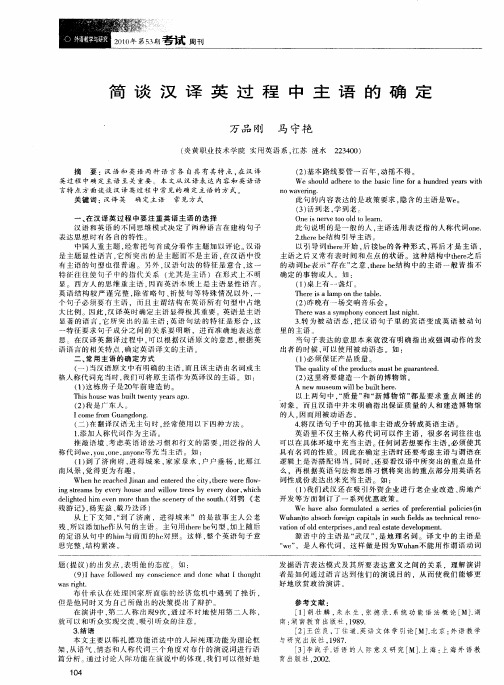
T e q a i f h r d c s s b u rn e d h u l y o ep o u t t e 的博 物 馆 。 2这
A w u e ne m s um l u l h r wi beb it e e l
一
( ) 本 路 线要 管 一 百 年 . 摇 不 得 。 2基 动
We s o l d e e t h a i l e fra h n rd g as w t h u d a h r o t e b sc i o u d e e r i n h
n v nn o wa e g.
Thee i a nt et b e r sa lmp o h a l .
( ) 晚有 一场 交 响 音 乐会 。 2昨
Theewa y ho yc nc r a t g t r sa s mp n o e ls h . t ni
一
3 转 为 被 动 语 态 . 汉 语 句 子 里 的 宾 语 变 成 英 语 被 动 句 . 把 里 的 主 语 当 句子 表 达 的意 思 本 来 就 没有 明确 指 出或 强 调 动 作 的发 出 者 的 时候 , 以使 用 被 动 语 态 。如 : 可 ( ) 须保 证 产 品质 量 。 1必
Thi o s sbul n yy a sa o sh u ewa itwe t e r g t
( ) 是 广 东人 。 2我
Ic m efo Gua g n . o r m n do g
( ) 翻译 汉 语 无 主句 时 , 常使 用 以 下 四种 方 法 。 二 存 经 1 加 人 称 代 词作 为 主 语 。 . 添 推 敲语 境 、 虑 英 语 语 法 习惯 和 行 文 的 需 要 , 泛 指 的人 考 用 称 代词 w .o .n ,n o e 充 当主 语 。如 : e yu oea yn等 ( ) 了济 南 府 , 得 城 来 , 家 泉 水 , 户 垂 杨 , 1到 进 家 户 比那 江 南 风 景 . 得 更 为有 趣 。 觉
汉英翻译中主语的选取
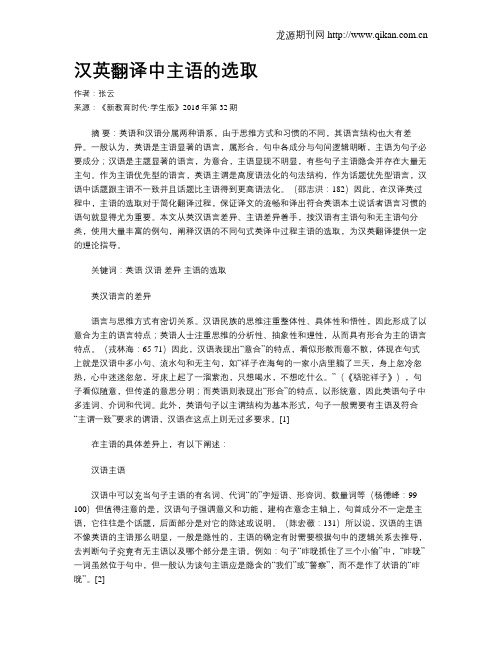
汉英翻译中主语的选取作者:张云来源:《新教育时代·学生版》2016年第32期摘要:英语和汉语分属两种语系,由于思维方式和习惯的不同,其语言结构也大有差异。
一般认为,英语是主语显著的语言,属形合,句中各成分与句间逻辑明晰,主语为句子必要成分;汉语是主题显著的语言,为意合,主语显现不明显,有些句子主语隐含并存在大量无主句。
作为主语优先型的语言,英语主谓是高度语法化的句法结构,作为话题优先型语言,汉语中话题跟主语不一致并且话题比主语得到更高语法化。
(邵志洪:182)因此,在汉译英过程中,主语的选取对于简化翻译过程,保证译文的流畅和译出符合英语本土说话者语言习惯的语句就显得尤为重要。
本文从英汉语言差异、主语差异着手,按汉语有主语句和无主语句分类,使用大量丰富的例句,阐释汉语的不同句式英译中过程主语的选取,为汉英翻译提供一定的理论指导。
关键词:英语汉语差异主语的选取英汉语言的差异语言与思维方式有密切关系。
汉语民族的思维注重整体性、具体性和悟性,因此形成了以意合为主的语言特点;英语人士注重思维的分析性、抽象性和理性,从而具有形合为主的语言特点。
(戎林海:65-71)因此,汉语表现出“意合”的特点,看似形散而意不散,体现在句式上就是汉语中多小句、流水句和无主句,如“祥子在海甸的一家小店里躺了三天,身上忽冷忽热,心中迷迷忽忽,牙床上起了一溜紫泡,只想喝水,不想吃什么。
”(《骆驼祥子》),句子看似随意,但传递的意思分明;而英语则表现出“形合”的特点,以形统意,因此英语句子中多连词、介词和代词。
此外,英语句子以主谓结构为基本形式,句子一般需要有主语及符合“主谓一致”要求的谓语,汉语在这点上则无过多要求。
[1]在主语的具体差异上,有以下阐述:汉语主语汉语中可以充当句子主语的有名词、代词“的”字短语、形容词、数量词等(杨德峰:99-100)但值得注意的是,汉语句子强调意义和功能,建构在意念主轴上,句首成分不一定是主语,它往往是个话题,后面部分是对它的陈述或说明。
汉译英主语的确定
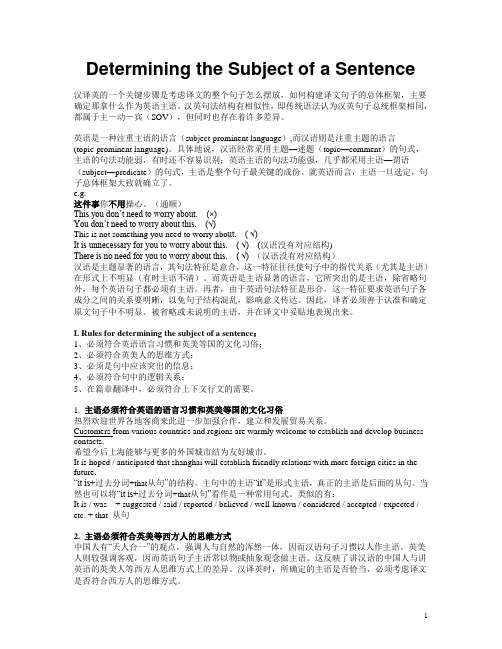
Determining the Subject of a Sentence汉译英的一个关键步骤是考虑译文的整个句子怎么摆放,如何构建译文句子的总体框架,主要确定那拿什么作为英语主语。
汉英句法结构有相似性,即传统语法认为汉英句子总统框架相同,都属于主-动-宾(SOV),但同时也存在着许多差异。
英语是一种注重主语的语言(subject-prominent language),而汉语则是注重主题的语言(topic-prominent language)。
具体地说,汉语经常采用主题—述题(topic—comment)的句式,主语的句法功能弱,有时还不容易识别;英语主语的句法功能强,几乎都采用主语—谓语(subject—predicate)的句式,主语是整个句子最关键的成份。
就英语而言,主语一旦选定,句子总体框架大致就确立了。
e.g.这件事你不用操心。
(通顺)This you don’t need to worry about. (×)You don’t need to worry about this. (√)This is not something you need to worry abo ut. ( √)It is unnecessary for you to worry about this. ( √) (汉语没有对应结构)There is no need for you to worry about this. ( √) (汉语没有对应结构)汉语是主题显著的语言,其句法特征是意合,这一特征往往使句子中的指代关系(尤其是主语)在形式上不明显(有时主语不清)。
而英语是主语显著的语言,它所突出的是主语,除省略句外,每个英语句子都必须有主语。
再者,由于英语句法特征是形合,这一特征要求英语句子各成分之间的关系要明晰,以免句子结构混乱,影响意义传达。
因此,译者必须善于认准和确定原文句子中不明显、被省略或未说明的主语,并在译文中妥贴地表现出来。
无主句翻译

这次国家调动了160万军队去帮助守护大堤,将 被洪水淹没地区的百姓迁走。 1.6 million troops have been mobilized to help protect the dikes and to move people out of areas being flooded. 到去年年底,上海已与好几个国家签订了建造拉 索桥的合同或协议。 By the end of last year,contracts or agreements were signed with some countries for the construction of stayed bridges in Shanghai.
2
主语选择的原则
无主句必须添加必要的主语; 必须是句中应该突出的信息; 必须符合英美人的思维视角; 必须符合英语的逻辑搭配习惯; 必须符合行文连贯的需要。
2. 1 无主句翻译,添加必要的主语
下雨了。 It is raining. 得第一名获金牌,第四名什么也拿不到。 Whoever comes first wins a gold medal but anyone who comes fourth gets nothing.
汉语中用地名、时间、工具作主 语很普遍
昨晚抓住了三个小偷。 Three thieves were caught last night. 一把菜刀闹革命。 His revolution started with a kitchen knife. 校园东头盖了一栋公寓。 A new apartment has been built on the east of the campus.
汉译英时 如何确定主语

以原句主语作译文主语
• 英语句中的主语只能是名词、主格人称代 词或名词性的词语。当汉语原文有明确的 主语,而且该主语由名词或主格人称代词 充当时,我们可以原主语作为英译文的主 语。如:
• 1.幽默是智慧、学识、机敏的结晶,幽默 在我们社会、家庭、工作、学习、生活中 不可或缺。 • Humor is the crystallization of wit,knowledge, and resourcefulness.It is also indispensable to our work,study,family,society,and life is in general.
unlessweburstoutweshallperish添补包括作者和读者在内的we作主语成功地传达了鲁迅对反对派屠杀进步人士的愤慨对国家及民众前途和命运的担忧还有他激励人们奋起反抗的呐喊
汉译英时,如何确定主语?
吴诗君 李双 蒋亚萍 曹璐 杨青慧
主语的确定:
• 以原句主语作译ቤተ መጻሕፍቲ ባይዱ主语
• 重新确定主语 • 增补主语
重新确定主语
• 在许多情况下,我们需要重新选择和确定 主语,以保证译文逻辑通顺、行文流畅、 语言自然地道,行使与原文相似的功能。 可以是句子其他成分,也可以是句外的词 语。如:
世纪之交,中国外交空前活跃
• a.The turn of the century finds China most acti-ve on the diplomatic arena. • b.At the turn of the century,China is very active in its diplomatic activities. • 有比较就有鉴别。将the turn (of the century) 替换原主语“中国”的译文a,比照原主语 的译文b地道、有韵味。
高中英语高考英汉翻译时中文与英文的主语选择问题
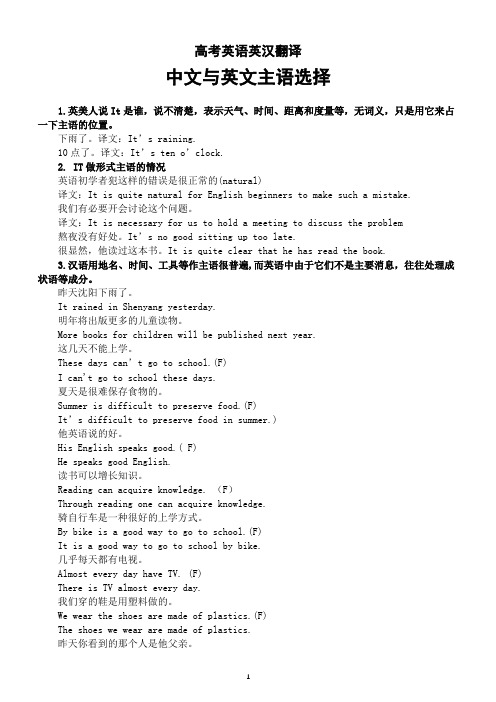
高考英语英汉翻译中文与英文主语选择1.英美人说It是谁,说不清楚,表示天气、时间、距离和度量等,无词义,只是用它来占一下主语的位置。
下雨了。
译文:It’s raining.10点了。
译文:It’s ten o’clock.2. IT做形式主语的情况英语初学者犯这样的错误是很正常的(natural)译文:It is quite natural for English beginners to make such a mistake.我们有必要开会讨论这个问题。
译文:It is necessary for us to hold a meeting to discuss the problem熬夜没有好处。
It’s no good sitting up too late.很显然,他读过这本书。
It is quite clear that he has read the book.3.汉语用地名、时间、工具等作主语很普遍,而英语中由于它们不是主要消息,往往处理成状语等成分。
昨天沈阳下雨了。
It rained in Shenyang yesterday.明年将出版更多的儿童读物。
More books for children will be published next year.这几天不能上学。
These days can’t go to school.(F)I can't go to school these days.夏天是很难保存食物的。
Summer is difficult to preserve food.(F)It’s difficult to preserve food in summer.)他英语说的好。
His English speaks good.( F)He speaks good English.读书可以增长知识。
Reading can acquire knowledge. (F)Through reading one can acquire knowledge.骑自行车是一种很好的上学方式。
翻译_主语的选择
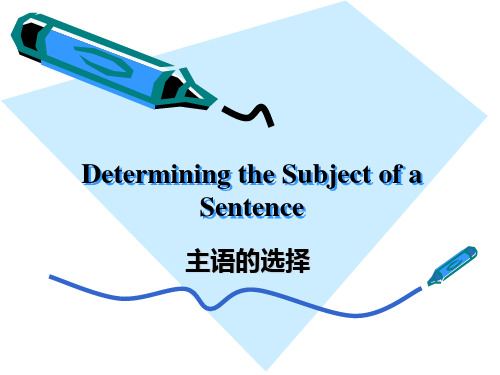
七大主要英语的主语
5. 时间主语 (temporal subject): Yesterday was Monday. 6. 事件主语 (eventive subject): The dispute over the problem lasted a decade. 7. it作主语,表时间、气候或距离: It is very late. It’s very hot in summer here. It 作形式主语: It is impossible to finish the paper in ten minutes.
七大主要英语的主语
1. 施动主语 (agentive subject): Susan is growing flowers. 2. 受动主语 (affected subject): Her books translate well. 3. 工具主语 (instrumental subject): A stone broke the glass. 4. 地点主语 (locative subject): The jar contains honey.
4. 只可惜宫粉涂不平脸上的皱纹,看起来好 像驴粪蛋上下了霜。 *Unfortunately powder could not smooth over her wrinkled face; it looked 1ike a frosted donkey turd. Unfortunately powder could not smooth over her wrinkled face. It only made it look like a frosted donkey turd.
1. 2
主语选择的原则
① 无主句必须添加必要的主语 ② 必须是句中应该突出的信息; ③ 必须符合英美人的思维视角; ④ 必须符合英语的逻辑搭配习惯; ⑤ 必须符合行文连贯的需要。
句子翻译之主语的选择
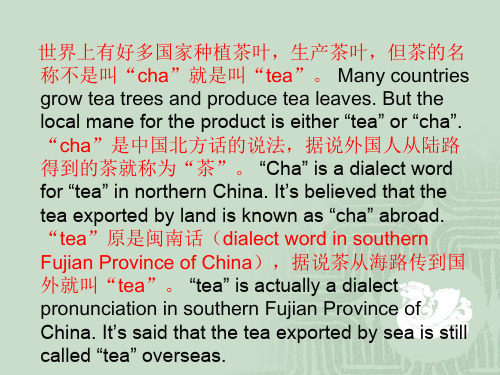
3. Adding Subjects to the Corresponding English Sentences
翻译方法
添加适当的代词或名词充当主语
用 “it” 充当主语 采用英语的被动结构译出
采用 “There be”结构译出
汉语祈使句译成英语祈使句
采用倒装语序译出
将非主语成分转为主语
不入虎穴,焉得虎子。 If one does not enter a tiger’s den, how can
one get a tiger’s cub? Nothing ventured, nothing gained. 忍一时风平浪静,退一步海阔天空。 If you are patient during one moment of anger, you will escape a hundred days of sorrow. 弄不好,就会前功尽弃。 If things are not properly handled, our work will have been in vain.
世界上有好多国家种植茶叶,生产茶叶,但茶的名 称不是叫“cha”就是叫“tea”。 Many countries grow tea trees and produce tea leaves. But the local mane for the product is either “tea” or “cha”. “cha”是中国北方话的说法,据说外国人从陆路 得到的茶就称为“茶”。 “Cha” is a dialect word for “tea” in northern China. It’s believed that the tea exported by land is known as “cha” abroad. “tea”原是闽南话(dialect word in southern Fujian Province of China),据说茶从海路传到国 外就叫“tea”。 “tea” is actually a dialect pronunciation in southern Fujian Province of China. It’s said that the tea exported by sea is still called “tea” overseas.
(二)主语的选择
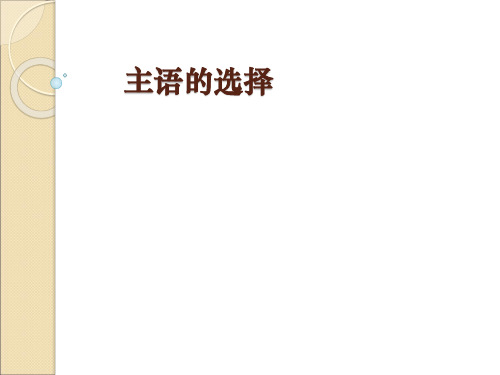
1. 2. 3. 4. 5.
Professor Li is a substitute for the teacher who is ill in hospital. His attitude toward the matter is one of indifference. Social customs are usually different from country to country. It was so cold that my fingers went numb. The sick child has been absent from class for several days. Her mother worried about her studies very much. The opinions of the attendants were far from unanimous about the issue so that some of them began to quarrel with each other. The atmosphere at the meeting became tense at the moment. The machine has broken down, so one of the technicians must be fetched. Recently there has been a trend toward simpler fashions in modern men’s clothes.
15. A)
In recent years the national economies of China and Thailand have quickly developed, providing a good foundation for economic and trade cooperation between the two countries.
汉译英翻译技巧(2)主语的选择
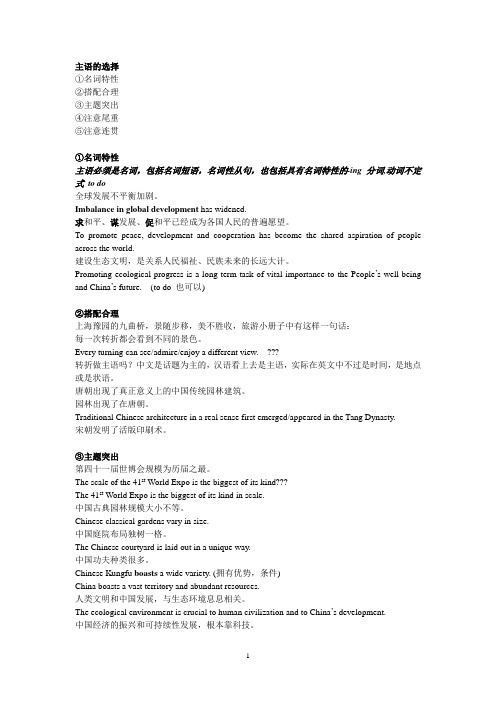
主语的选择①名词特性②搭配合理③主题突出④注意尾重⑤注意连贯①名词特性主语必须是名词,包括名词短语,名词性从句,也包括具有名词特性的-ing分词,动词不定式to do全球发展不平衡加剧。
Imbalance in global development has widened.求和平、谋发展、促和平已经成为各国人民的普遍愿望。
To promote peace, development and cooperation has become the shared aspiration of people across the world.建设生态文明,是关系人民福祉、民族未来的长远大计。
Promoting ecological progress is a long-term task of vital importance to the People’s well-being and China’s future. (to do 也可以)②搭配合理上海豫园的九曲桥,景随步移,美不胜收,旅游小册子中有这样一句话:每一次转折都会看到不同的景色。
Every turning can see/admire/enjoy a different view. ???转折做主语吗?中文是话题为主的,汉语看上去是主语,实际在英文中不过是时间,是地点或是状语。
唐朝出现了真正意义上的中国传统园林建筑。
园林出现了在唐朝。
Traditional Chinese architecture in a real sense first emerged/appeared in the Tang Dynasty.宋朝发明了活版印刷术。
③主题突出第四十一届世博会规模为历届之最。
The scale of the 41st World Expo is the biggest of its kind???The 41st World Expo is the biggest of its kind in scale.中国古典园林规模大小不等。
新四级翻译之--增译法

试译以下句子: 1. He bought her a Benz as a birthday
gift. 2. We won’t retreat; we never have and
never will. 3. This laser copier is indeed cheap and
fine. 4. 我不爱喝饮料。 5. 人和动物不同。
• 增词的情况是各种各样的。总的规则是: 为使译文忠于原文,需要增加什么就增加 什么,而且要适可而止。
• Some metals are easy to machine; others are not.
• 一些金属容易加工,而另一些金属却不容 易。
4/27/2020
增词方法
• 1、增词法(主语) • 2、增词法(谓语) • 3、增词法(时态) • 4、增词法(语气助词) • 5、增词法(省略句) • 6 、增词法(其他)
• 译文不能对原文意思有任何的增加或减少, 这是从事翻译工作必须遵守的一项基本要 求。
• 但是,这并不是说译文在文字上不能有任 何增减。
• 有时,为了确切、充分地表达原意,或为 使译文生动、通顺,符合汉语的习惯,常 常要在译文里做必要的文字上的增补或省 略。
4/27/2020
找出需要增加的词语吧!
• For many years there has been serious unemployment in that country.
• 多年来那个国家一直存在严重的失业现象。
4/27/2020
增词法(主语)
• The tensions between the two countries cannot be eased without sincere and honest communications.
汉英翻译中主语的选择与翻译

浅谈汉英翻译中主语的选择与翻译
□张琳琳
【摘 要】本文以汉英句子主语的句法功能对比为切入点,分析了汉语中主语句法功能弱、英语中则强的特点,以及汉语中存在 大量无主句,而英语句子一般都有主语的现象。并对常见的各种汉语句子进行了分类,探讨了其主语的选择与翻译 方法。
ห้องสมุดไป่ตู้
Industrial & Science Tribune 2012.(11).69
·151·
产业与科技论坛 2012 年第 11 卷第 9 期
试 论 高 校 党 建 与 优 良 校 风 、教 风 及 学 风 的 培 育
□李军良
【摘 要】加强“三风”建设是高校发展的永恒主题,也是高校党建工作的重要结合点、着力点和突破口,围绕培育优良的校风、 教风和学风开展党建工作,是新时期高校党建工作的本质要求,是实现高校培养人才目标的可靠保证,是加强学校党 建工作的科学途径。
其次,我们可以把汉语无主句的宾语转换为英语被动结 构中的主语,即把汉语无主句直接译成英语被动句。如下文 例子所示。
例 3 原文: 学校里禁止抽烟。 译文: Smoking is not allowed in the school. 分析: 原句中,“学校里”是地点状语,“禁止抽烟”这个动 作的执行者也就是主语在原句中是缺失的,但是并不影响我 们的理解。翻译成英语时,我们把原句的宾语部分“smoking” 直接作为译文的 主 语,采 用 被 动 结 构,既 符 合 英 语 表 达 习 惯 也能避免误解。 最后,汉语中还有一类无主句是用来表示请求、号召、口 号及标语等等,这类句子可译成英语祈使句。 例 4 原文: 游客止步。 译文: No visiters. 例 5 原文: 请等一下。 译文: Wait a moment,please. 例 6 原文: 为建设一个伟大的社会主义国家而奋斗! 译文: Strive to build a great socialist country! 分析: 例 4、5、6 三个句子都是典型的无主句,但又不同 于例 1、2、3 这种一般的无主句,它们在汉语中有着特殊的功 能。翻译成英语时,可 以 仿 照 英 语 中 的 同 类 句 式 来 译,不 需 要强加主语。 ( 二) 对于汉语中有主语部分的句子,我们按照意义可直 接翻译。对于有容 易 产 生 歧 义 的、或 者 译 文 有 特 殊 要 求 的, 我们要慎重主语的选择。 例 7 原文: 中国政府努力保护文化遗产。 译文: The Chinese government is trying to protect its cultural relics. 分析: 原句是个简单且结构完整的汉语有主句,译成英 语时,原句的主语 可 直 接 译 为 英 语 的 主 语,整 个 句 子 可 按 照 字面意义直译翻译。 例 8 原文: 边疆地区的教育事业获得不断的发展。 译文①: The border areas have witnessed continued educational development. 译文②: The education of the border areas have been developed continuously. 译文③: Continued educational development has been at
主语的选择

Chapter Eight: The Selection of Subjects
例4
纯净如青花
(1)瓷器 瓷器追求纯净优雅的美,这在青花瓷中体现最为充分。(2)青花瓷 青花瓷是中国瓷器的典型形态,明清两代 瓷器 这 青花瓷 出口的瓷器中,八成 八成是青花瓷。(3)青花瓷 青花瓷在唐代之前就有了,而真正形成规模并有杰出创造 真正形成规模并有杰出创造则是在元代, 八成 青花瓷 真正形成规模并有杰出创造 明代是青花瓷的成熟期,中国青花瓷器的大量珍品 中国青花瓷器的大量珍品出自这个时代。(4)青花瓷 青花瓷还与一个地名有关,这就是 明代 中国青花瓷器的大量珍品 青花瓷 这 中国的瓷都景德镇,自元代在景德镇创造出令人心醉的青花之后,明清两代这里 这里一直是中国瓷器的中心,皇 这里 皇 家的官窑也设立于此。(5)青花瓷 青花瓷也成了中国瓷器的代表。(6)青花瓷,在材料上,它的秘诀 它的秘诀就是氧化钴, 家的官窑 青花瓷 它的秘诀 氧化钴一经高温,就变成 以氧化钴在白色的胎体上作画,然后上釉,经过高温烧制便成了青花。(7)因为氧化钴 氧化钴 蓝色。(8)乳白色的底子,上面加上清澈的蓝色,外面罩上透明的釉,形成鲜洁光亮﹑清雅透明的效果。
theselectionofsubjects例2在新世纪全面建设小康社会加快改革开放和现代化建设步伐顺利实现第三部战略目标必须在加强社会主义法制建设依法治国的同事切实加强社会主义道德建设以德治国把法制建设与道德建设依法治国与以德治国紧密结合起来通过公民道德建设的不断深化和拓展逐步形成与发展社会主义市场01 BC, Confucius, the most famous philosopher in Chinese history, asked Laozi, another great philosopher, for the third time about rites of civility. Laozi’s philosophical theory and his criticism in the slave-owning system so shocked and so inspired Confucius that he was entranced for three days. He sighed to his pupils that Laozi was as mysterious and unpredictable as the dragon, that his theories were integral when joined, and like scattering clouds when apart. Laozi’s surname was “Li”, so later on all the people with the surname “Li” were called “the dragon family”.
汉译英翻译中汉语无主句主语的选择技巧

分 句 的形式 ,而 只保 留一个 ,就 导致 很 多独 立句 ,
如:在最后一段的行程, “ 我坐在椅子上, 淌着汗 , 四肢 无力 , 浑身酸痛——可是兴高采烈” 二是对话双方意 。 图清 楚 , 言而 喻 , 语境 成分 往往 省略 , 常 以部 分 不 该 这 对话 形 式 出现 。例 如 : 只 要用 功 读 书 ,就 能 提 高 成 “
那 儿 能 找到 解 决 问题 的 办法 ”“ 锅饭 能吃 十个 人 ” ,这
汉 语句法 具有 开放 性和松 散 性 ,结构 简单 明快 , 句 子 意义 的表 达主 要靠 句子 的 内部逻 辑联 系 , 汉语 句
中的一 些句子 不一 定要 有主 语 , 这些不 含 主语 的句 子
等等。 在汉 语 中 , 这种 句 子 比 比皆是 , 这种 句子 省略 了
关键 词 : 主句 ; 无 主语选择 ; 结构差 异
中图分类号: 35 H 1. 9
文献标识码: A
文章编号:6 39 8 (00 0— 10 0 17 — 842 1)6 0 0— 5
一
、பைடு நூலகம்
引言
时则 必须省 略 , 否则文 字不顺 畅。很 多词 性 或主 谓 词 组 、 宾词组 等都 可做 汉语 的主 语 。其 中, 动 以时 间 、 地 点名 词做 主 语 的情 况在 汉 语 中的使 用 的普 遍 性大 大 高于英 语 。
su is td e.
制 约 的关 系 ,即要 求主 语 人称 和 数 与谓 语 的形 式 一 致, 而且 有 一个 极 为 严格 的基 本条 件 , 即主语 必 须 是
而且只 能是名词或者主格代词 , 其他任何词若想要做
主 语 , 须在 形式上 作调整 , 必 使其 具有 名词 的性 质 … 1。 而 汉语 的主语 与谓语 呈一 种松 散 的结构 关系 , 主语 不 决定谓 语 的形 态 , 不是 不可 或缺 的 。而 且汉语 重 意 也 合 , 汉语 篇章 中 , 些句 子 的主语 常常 可 以省 略 , 在 某 有
英文学术论文翻译-中英文对照(三)
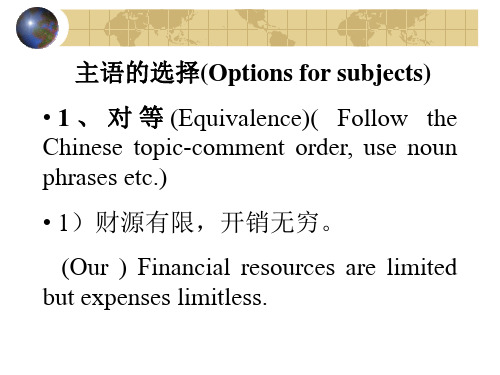
•These new measures will, we believe, increase the people’s purchasing power and lead to thriving financial and commercial conditions rather than make a mess of the country’s finances as some people argue.
一、主谓单句
汉语的主谓单句,从外形结构 上来看,跟英语的“主谓”结构是 相似的,但它的主语和谓语表达却 与英语有许多不同的地方。所以翻 译汉语主谓单句时,至少应注意几 个问题。
1、防止主语的机械对应。 中国近几年来发生了巨变。 ①There have been great changes in China these years. ②These years have seen (witnessed) great changes in China. ③Great changes have taken place in China these years. ④China crackles with the dynamics of changes these years.
汉语的基本句型及其翻译
汉语造句以名词为重心,以词组、散句和 分句为手段,善于按时间、逻辑顺序进行横 排式叙述,有时断句不严,外形松散。有人 称汉语是时间型的动态结构,主要体现于形 式自由,富于弹性。
英语则以“主—谓”主干结构为重心来统 领各种语言成分,句界分明,外形严密。 因此,汉语各种句型译成英语时,不仅在 逻辑关系上而且在外形上都应该体现出英语 句法结构的特点。
2-3 Reversing • 1)沿路都是小商店。 Small shops dot the way. • 2)他这样悍然行事使我们非常气恼。 Hot anger burned in our minds against him at his rashness.
汉译英中如何选择主语

・
6 3・ 第1 1期 来自鸡 西 大 学 学 报
2 O 1 3年
“ 人类” 的词或活生生的事物作为主语。此外, 英国人更强
在英文句子中, 主语和谓语之间存在一定的语法关系。
调客观性, 因此英文句子通常把表示“ h u m a n b e i n g ” 的词放 主语通常是名词或人称代词。在汉语中, 几乎所有的词都 在一个不太重要的位置。 能直接当作主语使用。因此当 我们选择主 语时, 必须考虑 例句: 沉默了很长时间的丈夫, 突然说 出这样的话来, 到主语和谓语是否符合一定的逻辑关系。如果我们把中文
句子结 构翻 译 中最重要的任务 , 因为英语 主语是 句子最 重要 的部份 。比较 了中文句子 结构和英 文句子 结构之 间 的差异 以及 汉语 主语 和英语主语之 间的不 同, 并且 阐述 了汉译英 中主语选择 的原 则以及各种 方法和技巧 。
关键词 : 主语选择 ; 翻译 ; 主题 突 出; 主语 突 出
( 1 ) 根据主谓搭配的特征 , 英文句子通常以无生命的
语法特征。因此几乎每个英文句子都有一个主语 , 除了一 事物或抽象名词作为它们 的主语。这种句子通常有拟人 些省略句和祈使句。英语主语有七种类型: 施动主语、 受事 感。它们不仅生动而且简洁、 明了。相反地, 中国人总是有
主语、 工具主语、 地点主语、 时间主语、 事件 主语和“ I t ” 主 把 自 然和人类混为一体的思想。因此中文句子通常以表示
二 主语选择的原则和方法
关系很重要。因此英语结构是紧凑的, 而汉语结构是简洁、
明晰的。不论句子有多复杂, 大部份的英文句子一定有主
- 1、下载文档前请自行甄别文档内容的完整性,平台不提供额外的编辑、内容补充、找答案等附加服务。
- 2、"仅部分预览"的文档,不可在线预览部分如存在完整性等问题,可反馈申请退款(可完整预览的文档不适用该条件!)。
- 3、如文档侵犯您的权益,请联系客服反馈,我们会尽快为您处理(人工客服工作时间:9:00-18:30)。
汉语主语(被陈述的话题)
• 汉语主语是谓语说明的对象,可以是名词、代 词、数词、量词,或者动词短语、主谓短语等, 如:
• • • • • • • 1 2 3 4 5 6 7 这本杂志我不看了。 那边正在卖冰激凌。 西瓜吃完了。 小和山顶上开了一家酒吧。 这么快就挂了? 那个班的同学,十有八九是德国人。(外位语) 这些教材我们自学很容易。
5. 得第一名获金牌,第四名什么也拿 不到
Whoever comes first wins a gold medal but anyone who comes fourth
gets nothing.
• 6 不要有了新亲,把旧亲忘个干净!这种 没良心的人我见多了!--《围城》
• Once you have new relatives, don’t forget the old ones. I’ve seen too many such ungrateful people.
英美人则较强调客观,注重客观事物对人的影 响和作用,因此无生命、抽象的名词作主语远 比汉语中多。英语这类非人称主语句采用“无 灵主语” (inanimate subject),表示抽象概念、 心理感觉、事物名称或时间地点等,但谓语却 常常使用“有灵动词” (animate verb),表示人 或社会团体的动作和行为,如 see , find , bring , give , escape , surround , kill , deprive , seize , send , know , tell , permit , invite , take , drive , prevent. . . from等。
1. 2
主语选择的原则
① 无主句必须添加必要的主语 ② 必须是句中应该突出的信息; ③ 必须符合英美人的思维视角; ④ 必须符合英语的逻辑搭配习惯; ⑤ 必须符合行文连贯的需要。
1. 2. 1
无主句翻译,添加必要的主语
1. 起大风了。 It is blowing hard. 2. 改革开放胆子要大一些,要敢于试验。 When it comes to reforms and opening-up, we must be courageous enough to venture on experiments. 3. 北静王笑道:名不虚传,果然如“宝”似“玉”。 “ You live up to your name,” remarked the prince. “You are really 1ike precious jade.”
中国人在表达思想时十分注意主体意识, 常以有生命的、具体的名词或代词作主语, 多用主动语态和无主句。有时主语虽省略, 主体意识仍然强烈,读者容易体会到。如: 找工作处处碰壁,搞得我心乱如麻。 MY jobhunting has failed again and again and it made me terribly upset.
1. 这时我激动得说不出话来。 Words failed me here. More examples: ① 我昨天收到你的信。 Your letter reached me yesterday. ② 我一时记不起他的名字。 His name escaped me.
2. 不同的人对退休持不同的态度。 Attitudes towards retirement vary from person to person. 3. 她从来没想到他是个不诚实的人。 It never occurred to her that he was a dishonest man. 4. 我害怕起来了,而且越来越害怕。 Then fear set in and commenced to build up.
2. 人们已把李白的诗集译成了多种外国文字。 The collection of Li Bai’s poems has been translated into many foreign languages. 3. 到去年年底,上海已与好几个国家签订了 建造拉索桥的合同或协议。 By the end of last year,contracts or agreements were signed with some countries for the construction of chain bridges in Shanghai.
1. 老子打儿子, 天经地义。 It is perfectly justified for a father to beat his own son. 2. 上面坐着主席团。 On the platform were sitting the members of the presidium. 3. 从她那儿能找到解决问题的办法。 We can turn to her for a solution. 4. 说的是古代的一个老头,名叫愚公。 The story is about an old man named Yugong in ancient times.
七大主要英语的主语
1. 施动主语 (agentive subject): Susan is growing flowers. 2. 受动主语 (affected subject): Her books translate well. 3. 工具主语 (instrumental subject): A stone broke the glass. 4. 地点主语 (locative subject): The jar contains honey.
给国家纳税是天经地义的事。 It is only right and proper that we should pay taxes to the state.
1. 1
ห้องสมุดไป่ตู้
汉英主谓结构的差异
“(主谓)这种句子(即使把被动的动 作也算进去,把‘是’也算进去)的比例是 不大的,也许比50%大不了多少。因此,在 汉语里,把主语、谓语当作话题和说明来看 待,比较合适。” —— 赵元任《汉语口语语法》
主题VS.主语
汉语是“注重主题的语言”(topic-prominent language) ,是话题评论式的。 汉语:话题+评论/说明 英语是“注重主语的语言”(subject-prominent language )。英语的主谓是施事行为式的。 英语:主语(施事者或受事者)+谓语(行为)
5. 大多数高校已将权利下放给系主任。 In most colleges and universities,the decision-making rights have been given to department heads. 6. 明年将出版更多的儿童读物。 More books for children will be published next year.
Determining the Subject of a Sentence
主语的选择
1. 钱你不用还了。 You don’t have to pay it back/repay the money. 2. 这锅饭能吃十个人。 This pot of rice can feed ten people. 3. 这匹马骑着两个人。 On the horse were riding two people. 4. 被人缠上是件讨厌的事儿。 It is annoying to be pestered/troubled.
5. 他突然发现地毯上有个深色斑点。 A dark stain on the carpet caught his eyes/suddenly attracted his attention. 6. 他两天就抽完了一包烟。 A pack of cigarettes lasts him only two days.
汉语中用地名、时间、工具作主语很普遍
1. 昨晚抓住了三个小偷。 Three thieves were caught last night. 2. 一把菜刀闹革命。 His revolution started with a kitchen knife.
3. 校园东头盖了一栋房。 A house has been built on the east of the campus.
7. 热烈欢迎世界各地客商来此建立和发 展贸易关系。 Customers all over the world are warmly welcomed to establish and develop business contacts with us.
1. 2. 3 主语必须符合英美人的思维视角
• 沉默呵,沉默呵!不在沉默中爆发,就 在沉默中灭亡。--《纪念刘和珍君》
• Silence! Silence! Unless we burst out, we shall perish in this silence!
1. 2. 2 主语必须是句中应该突出的信息
1. 这次国家调动了 160 万军队去帮助守护大堤, 将被洪水淹没地区的百姓迁走。 1.6 million troops have been mobilized to help protect the dikes and to move people out of areas being flooded.
• 方鸿渐看大势不佳,起了恐慌。洗手帕, 补袜子,缝纽扣,都是太太对丈夫尽的 义务。自己凭什么享受这个权利呢?
• The whole situation with Miss Su made him feel uneasy. Washing handkerchiefs, mending socks, and sewing on buttons— these were the little chores a wife perform for her husband. On what basis was he enjoying these privileges?
